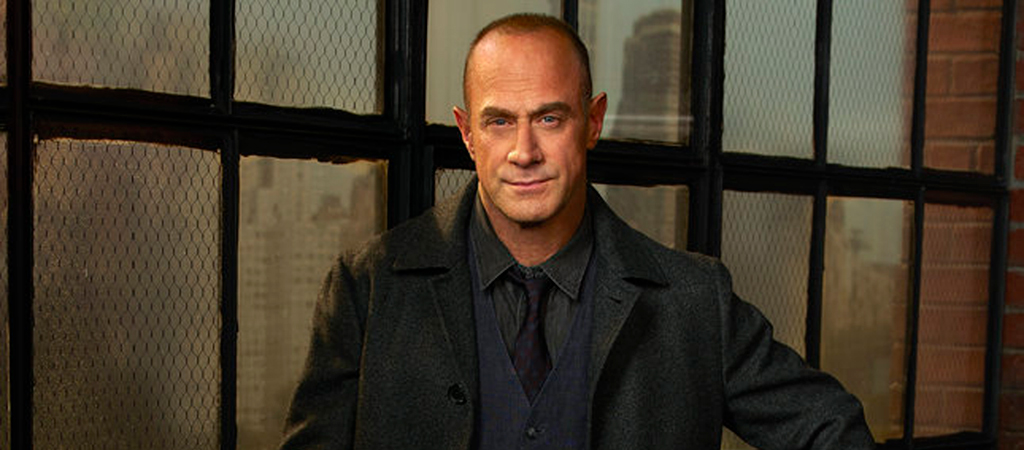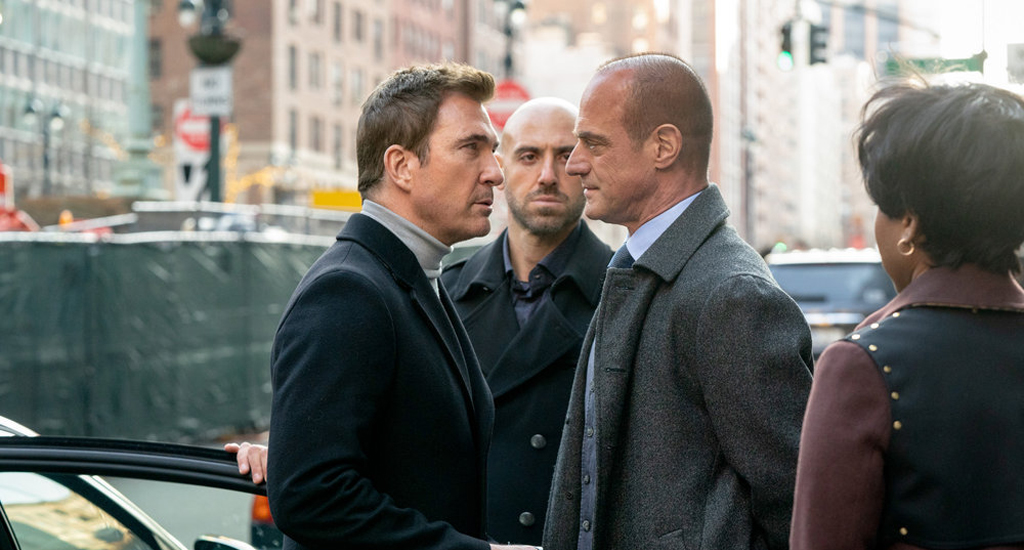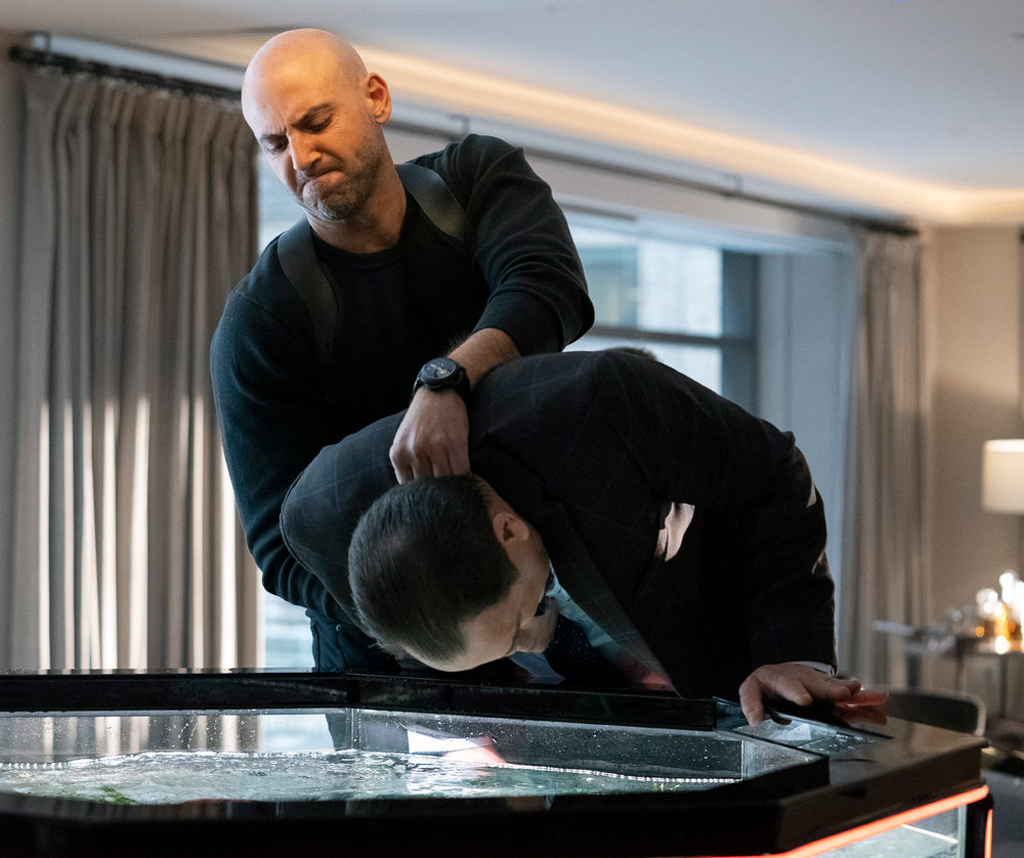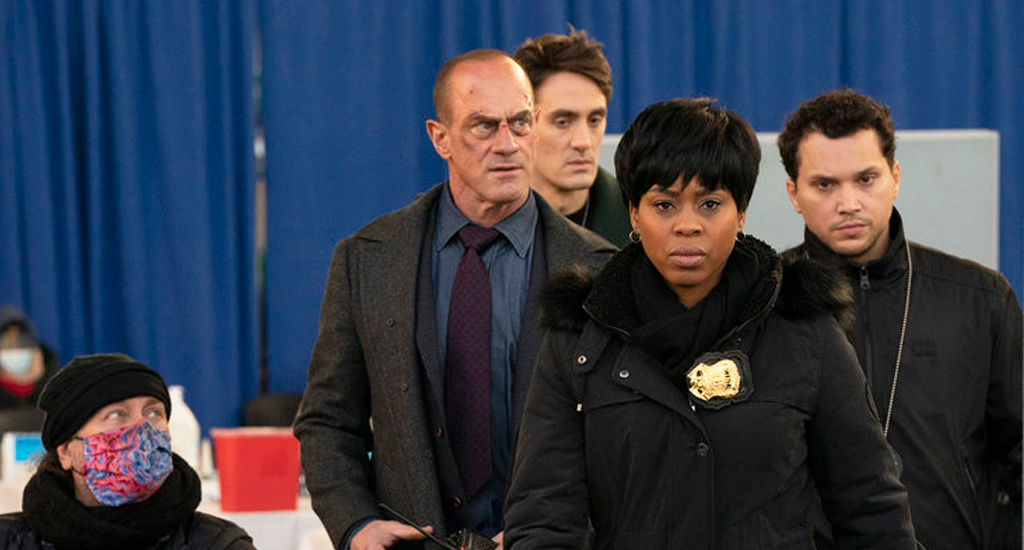
Earlier this month, Law and Order: SVU welcomed back the “prodigal son” (as he was actually referenced in an episode title), hot-headed cop Elliot Stabler, to the NYPD. The crossover event finally had Christopher Meloni in the same room(s) again with Mariska Hargitay’s Olivia Benson and Ice-T’s Fin Tutuola. Obviously, there’s a sentimental factor here. People loved Stabler’s camaraderie with Benson (who is now a captain), and he was absurdly beloved as a character (damn that Meloni charisma), but oh boy, it is hard to look back on Stabler’s behavior without feeling conflicted. And to be perfectly blunt, Elliot Stabler’s name feels ironic these days because he looks like the portrait of an unstable cop. With the launch of Meloni’s Organized Crime spinoff series, it’s interesting to see how the franchise is handling this cop with the checkered past.
Viewers will remember that Meloni’s 2011 departure from SVU all boiled down to a contractual dispute. Yet Stabler had grown notorious for using excessive force and pushing around witnesses and, most damningly, he shot six people in the line of duty. The final shooting occurred when a teenage girl brought a gun into the station house, and Stabler subsequently left the force. He did so abruptly and without even bidding farewell to Benson, who now believes (probably accurately) that he simply didn’t want to go through the counseling hoops. It was not a good look for Stabler, and he needs to do the work to make amends for Organized Crime to fully succeed.
How is the show doing so far? Surprisingly well, and it feels like an (intentional) work in progress. I did expect Stabler’s return to be more, well, awkward. Instead, Organized Crime feels enjoyable, mostly for the way that the show’s delighting in gently roasting Stabler. The dragging is happening, for sure, even though it’s happening slowly. It would be rather heartless for everyone to come down hard on him right after his wife got killed, which definitely happened in the crossover episode with the whodunnit aspect still unsolved. In the meantime, Stabler has not taken any time off work. It’s also revealed that he’s been an NYPD liaison in Rome for years, and suddenly, he’s sliding back into stateside duty and going up against an indisputably bad guy, towards whom it is perfectly acceptable to go toe-to-toe with while making angry faces.
Dylan McDermott’s mafia-brat villain, Wheatley, wields a damn octopus as a weapon.

An octopus. As a weapon.

That’s pure evil, man. It’s wise for the show to position Stabler (at least from the start) against a guy who everyone knows is a baddie. There are no antihero shades, and no reason for anyone to feel sympathy (we’ve seen Wheatley have his own dad killed). When it comes to successive villains, though, we need to see Stabler have to strive for growth. We need to see him make the correct calls against someone who isn’t (to be blunt) a rich white guy. And we need to see Stabler abandon his intimidation tactics, too. He already messed up in the interrogation once since his return, and he promised Olivia that it wouldn’t happen again. So while we wait on that subject, let’s do a quick listing of the ways that Organized Crime isn’t letting Stabler get away with everything.

— Stabler’s new boss is Sergeant Ayanna Bell (Danielle Moné Truitt), and I feel so giddy to see those shots where he’s walking behind her confident self. She doesn’t take kindly to his attitude following her inquiry of his six on-the-job shootings. “All of them good!” Stabler popped off in defense, despite skipping town on the last one and easily scoring a good-old-boy return to the force. He grouses about how he doesn’t want to be judged for his behavior twelve years ago, and this dialogue is telling:
Stabler: “I was a damn good cop then. I’m a better cop now.”
Bell: “Guys who came up when you did, you guys never think you really need to change your ways.”
Stabler: “Really? You know you’re profiling me right now?”
Bell: “Detective Stabler, you don’t know a damn thing about being profiled.”
Boom. Stabler didn’t have a comeback, either. The humor isn’t entirely coming across in mere dialogue, but damn, this was the good stuff.
— Oh, I’m gonna talk about Stabler’s new boss again because this is the primary way (again, so far) that the show’s telling him to cool it. Sergeant Bell is not only a Black woman, but she’s also gay. They have a discussion on “demographics” (as Bell puts it), where she points out that as a gay Black woman, she would never be allowed to cross lines like Stabler did back in the day. She articulates that he’s got a higher pay grade than she does, even though she’s his boss, and Stabler doesn’t say much to this, other than that she’s “still the boss.” They seem to come to an unspoken agreement about the unfairness of the situation, and Stabler then wonders aloud if they are “partners,” and Bell calls them “equals.” I did laugh when she asked, “Do you know what it’s like being Black, female, and gay?” All he could say in response was this: “You know I do not.”
— Clearly, there’s a lot of inner wrestling happening with Olivia Benson and from Sergeant Bell, too. On Bell’s part, she tells her wife that even though Stabler is part of the old “gladiator” style of cops, she thinks he’s working on his demeanor. Whereas Olivia is truly worried about him. She frets over how he pounced at her witness during interrogation, and he was offended when Olivia called him out. “Don’t tell me that we don’t do it that way anymore please,” he chastised her. “I’ve been living in Europe, not under a rock.” Then he added, “Brave new world, I got it.” Yep, Organized Crime is not letting Stabler walk in, retooled and with a clean slate. He’s got work to do.
Currently, the show’s acting like Stabler will not be allowed shortcuts, but we’ll see how this season continues. We’re in a different TV cop landscape than we were a decade ago when Stabler departed. In the interim, showrunners have had to grapple with real-life civil unrest amid waves of tragic instances of police brutality — horrible behavior that has led to the cancellation of reality series including Live PD and the long-running Cops — and adapt accordingly. On one hand, Stabler’s return to the force signals the lingering power of the good-old-boys’ club in the TV portrayal of the NYPD. On the other hand, this is a chance for Law and Order to reform one of its most flawed characters.
‘Law and Order: Organized Crime’ airs new episodes on Thursday nights.
